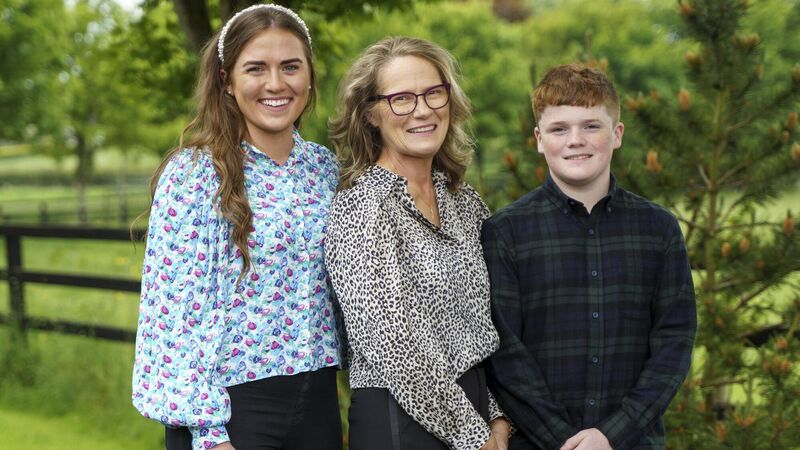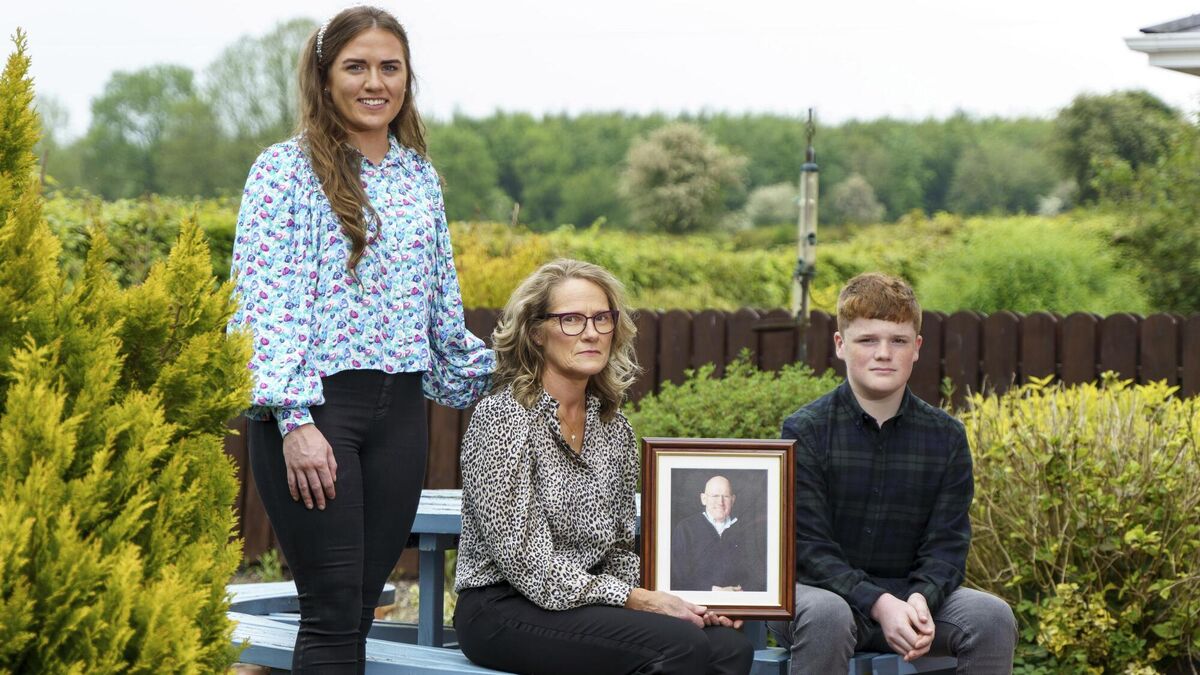'It’s an absolute tsunami for children': Helping kids deal with the loss of a parent

Anne Comerford with her children Caoimhe and Peter who benefitted greatly from the support of the Children's Grief Centre in Limerick when their father PJ passed away at a young age. Picture: Don Moloney
Anne Comerford’s daughter Caoimhe did not want to go to the Children’s Grief Centre in Limerick after her father died. She cried and was cross at the thought. But when the first-year student came out of her first session, she had already made plans to see Sr Helen again.
Today the 21 year old can’t emphasise enough the sense of welcome, safety and ease she felt while she was at the Centre, which is the only one of its kind in the country and is free to attend.
Anne’s husband had been diagnosed with a brain tumour and died 10 years later in 2011 at the age of 48. At the time, their children, Jack, Caoimhe and Peter were aged 13, 11 and five.
“Nothing can prepare you for the finality of when that person is gone,” says Anne. “That this is now your life and you have to live with the loss of the person in that life. Whatever about the bombshell for me, it’s an absolute tsunami for children.”
In the aftermath of PJ’s death, the family coped but, about a year and a half later, Anne got the feeling that there was something amiss. “I just felt that nothing was wrong and everything was wrong.”
She had a chat with Sr Helen Culhane, who had set up the volunteer-led centre in Limerick in 2009. “I was very lucky, in 2013 there wasn’t a huge waiting list so when I did reach out for help, I didn’t have to wait very long.”
Her eldest boy Jack went for just one session, and Anne saw an immediate impact. “There was a subtle difference in Jack. I noticed he had relaxed.”
For teenagers, the sessions are confidential, says Anne. If they want to share what was discussed, they can but they’re under no obligation to do so.
“As a parent, I would have given anything to know what they’re saying. I kind of wanted vindication of how I was coping and whether they thought I was doing okay. I subsequently realised the value of it, teenagers need that space where they can just be themselves and they don’t have to worry about how I feel.”
Her youngest son, Peter, was six years old when he spoke to Sr Helen, a qualified play therapist. Anne stayed in the waiting room. Even now, years later, the sense of peace she experienced during that time still has an impact on her.
A parent is called in if the child wants to share something after a session. On one occasion, Peter showed Anne a picture of a smiley face, and he said that he was happy because he had forgotten. “It has really stuck with me. He’ll never forget his dad, but children need to be allowed to be in the now.”
Anne, who is now on the board of directors of the centre, says that a child’s grief will come and go. “They’ll be happy and they’ll be sad.
“You’re trying to protect your children, but they’re also trying to protect you. They don’t want to see their mum upset.”
Sr Helen echoes this, saying “we find with bereavement, children will model how the surviving adult behaves”.
She cites the case of a young girl whose father had died in his sleep. Mother and daughter were staying in a relative’s house and Sr Helen told her mother that she needed to move back home, saying “she had lost her dad, she didn’t need to lose her home and she doesn’t need to lose you”.
The tough love paid off. This past Christmas, Sr Helen bumped into the little girl’s mother, who said that it was a lucky day when they went to the Children’s Grief Centre. If they hadn’t met Sr Helen, she said, they would still be staying in her sister’s house, and now her daughter is coping really well.

Sr Helen was 24 years old when she joined the Sisters of Mercy. She trained as a social worker and is also a qualified psychotherapist and counsellor. She has always been passionate about helping children, and the aim of the centre is to help children deal with grief as a result of bereavement and parental separation or divorce.
“We support children who have been affected by loss, we don’t offer counselling, we don’t offer therapy, and I wanted that because my life and professional experience has taught me that most children don’t need counselling or therapy,” says Sr Helen, who was named Limerick Person of the Year in 2017.
During one session, a boy who had been attending the Centre on and off for several years, drew a picture of a big judge with a speech bubble coming out of his mouth and the word ‘guilty’ written inside it. In a corner of the page, he had drawn a tiny blob, which he described as himself.
The boy told Sr Helen that the judge was sentencing him to 28 years in prison. “He looked at me and said don’t tell me not to feel guilty because I do.” His sibling had died a few years previously.
Sr Helen asked if he would like to share this picture with his mother. “His response – and I get this a lot from children whether it’s bereavement or separation – was that ‘she might be upset’. Children protect their parents.”
The impact of parental separation on children can be very similar to bereavement, says Sr Helen. “We see a lot of children whose mums and dads have separated, and they grieve the very same. What’s the most distressing is that they say it’s not the end of the world that their parents have separated - they can cope with that - what they can’t cope with is being used as a pawn.”
One of the most important things is for children who attend the service is that the door is open for them to return at any stage up to 18 years of age, says Anne. Her daughter Caoimhe returned during her Leaving Cert year when her grandfather, who had been her “rock”, was diagnosed with cancer.
Anne, who is a pre-school teacher, says many people underestimate the effect of grief on children. “If their grief is boxed off or they don’t get to articulate it for themselves, it will resonate, maybe negatively, for the rest of their lives, whereas if the release is given in a positive way, they will remember that for the rest of their lives, it will set them up, it gives them the tools.”
To date, the centre, which focuses on early intervention, has helped some 1,500 children. Sr Helen says that there are now 300 children on the waiting list.
The centre has been gifted a building at Mary Immaculate College in Limerick. Anne says that it has fabulous potential, but they need donors to help fund the substantial renovation necessary to make it suitable for their needs.
Sr Helen believes that it’s too soon to deal with Covid grief, but she has noticed a difference in the tone of the calls she receives from parents now. “There’s much more anxiety and panic in their voices. When we’re grieving first, we’re in a fog and I can see it in about 12 months, there will be a massive need for services.”







